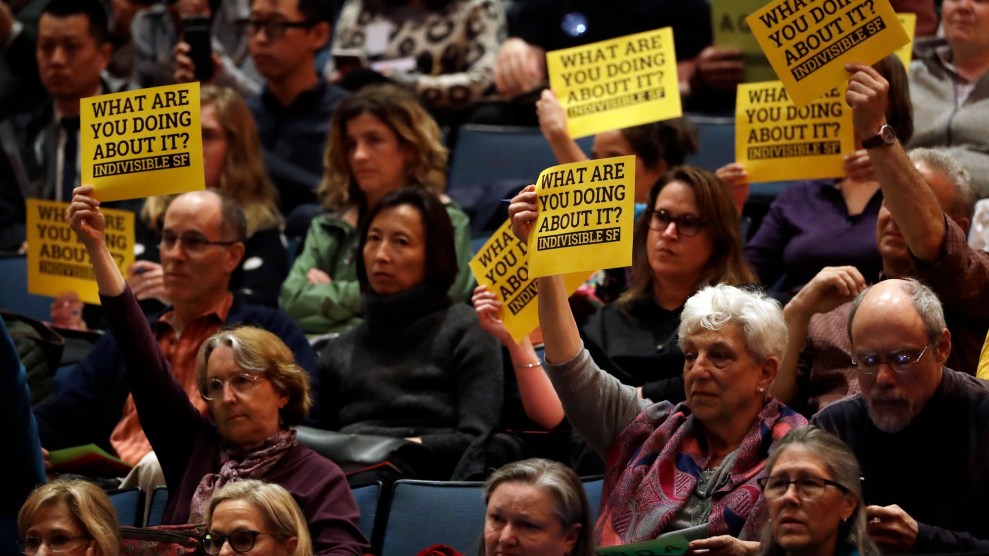
Gavin NewsomJeff Chiu/AP
Even as California Democrats battled to make headway in Republican-held congressional districts, Tuesday’s primary confirmed their party’s lock on statewide offices, all but ensuring that the Golden State will maintain its opposition to President Donald Trump beyond November.
California operates an uncommon “jungle” primary, where top-two vote-getters, regardless of party, duke it out in the November general election. While this system was a source of unease for Democrats in tight congressional districts, it was less of an issue in these four statewide races where Democrats are frontrunners.
Governor
Longtime California Governor/philosopher king Jerry Brown is getting termed out at the beginning of 2019. Compared to some previous elections, the field of 27 candidates who competed in the gubernatorial primary was tiny.
In the days before Tuesday’s vote, most polling indicated that current lieutenant governor and former San Francisco Mayor Gavin Newsom would easily earn a place in the statewide general election. But the second spot in the “top-two” primary remained something of a toss-up until the very end. Though former Los Angeles Mayor Antonio Villaraigosa was an early favorite, polling closer to Election Day showed Republican accountant John Cox pulling into second.
Cox was once a distant third in statewide polls. But he picked up an endorsement from President Donald Trump via Twitter, which political watchers thought would consolidate the state’s dwindling Republican vote. As of Wednesday morning, Newsom had garnered 33 percent of the vote. Cox had 26 percent, and Villaraigosa trailed with 11 percent.
Trump congratulated Cox and suggested his performance fortold a “Red Wave” in November.
Great night for Republicans! Congratulations to John Cox on a really big number in California. He can win. Even Fake News CNN said the Trump impact was really big, much bigger than they ever thought possible. So much for the big Blue Wave, it may be a big Red Wave. Working hard!
— Donald J. Trump (@realDonaldTrump) June 6, 2018
U.S. Senator
Thirty-one people challenged Democrat Dianne Feinstein for her seat. Feinstein, who was first elected to the Senate back in 1992, is seeking her sixth term. Even though the state Democratic Party did not endorse Feinstein, polling showed that she would make the ticket easily. But it was less clear who would slip into the second spot.
In the days before the election, state Senator Kevin de León polled slightly ahead of a James Bradley, a Republican, for the number two spot. De León, who previously served as as the president pro tempore of the State senate, challenged (is challenging) Feinstein from the left.
On Wednesday morning, the Associated Press projected that Feinstein and De León would both advance to California’s November general election. As of Wednesday afternoon, Feinstein had received about 44 percent of the counted vote. De León’s 11 percent places him ahead of Republican Bradley, who had 9 percent. This means that Feinstein will face off against a fellow Democrat come November.
Lieutenant governor
Though his or her position is technically the second most senior in California’s state government, the lieutenant governor’s job description is pretty sparse. Aside from being the designated acting governor when the state’s chief executive is away or unable to work, the job’s only other responsibilities involve sitting on boards that oversee the state’s public lands and public colleges. (And waiting to run for governor.)
Eleven candidates jockeyed for a spot in the top-two primary. On Wednesday, Democrats Eleni Kounalakis and Ed Hernandez looked most likely to advance to November.
Insurance commissioner
California’s insurance commissioner is an under-the-radar position whose responsibilities are largely in the consumer protection realm. But this year’s race for the position is noteworthy because the two candidates who will advance to the November ballot have divergent perspectives on single-payer healthcare, which will likely emerge as the issue in this election. State Senator Ricardo Lara sponsored a much-discussed single-payer healthcare bill in 2017 and supports developing a public option. Former Insurance Commissioner Steve Poizner, in contrast, has said that candidates for this role who advocate single-payer should “probably should be running for a different post.” Both got 41 percent of the primary vote.
This article has been updated.
















